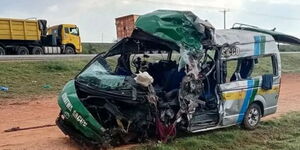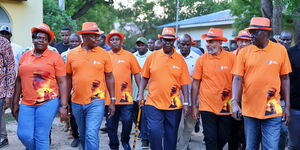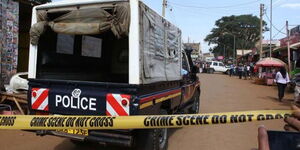On the morning of Friday, August 7, 1998, a bomb blast rocked the then United States Embassy in downtown Nairobi claiming over 200 lives and leaving over 4,000 people injured.
Abraham Muthogo Kamau - a survivor, however, lived to tell the story and his close encounter with death after the terror attack nearly claimed his life.
"It is true what they say-your life flashes before your eyes. Highlights of your life hurriedly blaze past in no particular order," Muthogo who is now 48 and has four children revealed.
[caption caption="Abraham Muthogo Kamau with his wife"] [/caption]
[/caption]
"I remember feeling like I was walking back and forth in a dark tunnel. Your brain stops, you feel so relaxed," the survivor told the Standard about his brush with death.
His narration of the "near-death" experience matches reports published by UK's The Telegraph, which indicate that life really does flash before your eyes when you die.
"I heard a sweet and soothing voice urging me to let go. It felt calm and peaceful. The voice was so convincing that I almost surrendered.
"But the picture of my one-year-old son quickly appeared before my eyes. It is my son's image that convinced me to be strong and not to give in to the tempting voice," the former Cooperative Bank of Kenya employee indicated.
Muthogo was working at the ground floor of Ufundi Cooperative House which is adjacent to the present day August 7th Memorial Park at the intersection of Moi Avenue and Haile Selassie Avenue.
The sturdy force of the explosion had shattered the glass wall, flung him out of the building and hurled him across the street in the process claiming 10 of his colleagues.
According to Muthogo, who is currently the CEO of Miradi Capital, a corporate advisory company, everyone on the first floor of the Ufundi Cooperative House, which housed a college, perished.
A scientific study by Hadassah University, Jerusalem, suggests that the intriguing mental phenomenon experienced by Muthogo arises from the fact that the parts of the brain that store autobiographical memories including the prefrontal, medial temporal, and parietal cortices are not susceptible to oxygen and blood loss during serious injuries.
[caption caption="A visibly agitated President Daniel Moi visiting the August 7th bomb blast scene"] [/caption]
[/caption]
These parts that store memories hence are one of the last brain functions to suffer as other parts of the brain and body fail leading to the flashback experience known as Life Review Experience (LRE).
The Telegraph notes that according to the participants, the life memories rarely follow any order but come randomly, and sometimes simultaneously and that many of the flashbacks involve intensely emotional moments.
The idea that life flashes in front of a person has been featured in countless works of literature and film with the study indicating that experience leaves the involved with a new perspective on their life events and on significant people in their lives.
"Those involved in the study said they lost all sense of time, with memories flying back at them from all periods of their life.
"This suggests that a representation of life-events as a continuum exists in the cognitive system, and may be experienced in extreme conditions of psychological and physiological stress," The Telegraph concludes.












